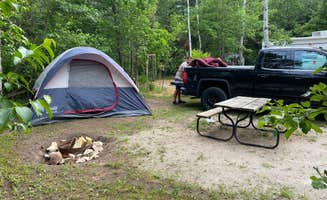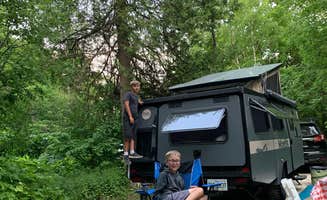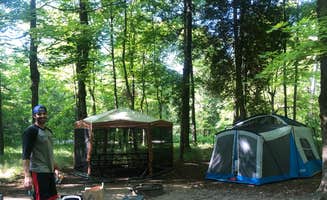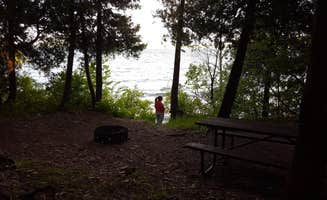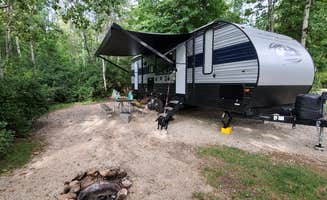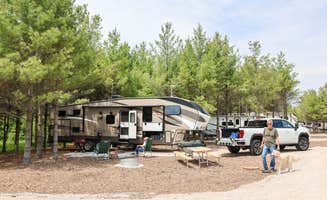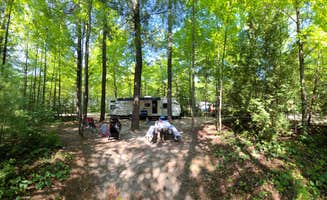Door County's eastern shoreline near Baileys Harbor features wooded campgrounds within a unique microclimate created by Lake Michigan, which moderates summer temperatures to average 75-80°F during peak camping months. Tent and RV sites throughout the area sit at elevations ranging from 580-650 feet above sea level, with most campgrounds nestled among northern hardwood forests that provide natural screening between sites. Winter camping opportunities exist but are limited primarily to Newport State Park, where temperatures regularly drop below freezing from December through March.
What to do
Lighthouse tours: 5-minute drive from Baileys Woods Campground to the Baileys Harbor Range Lights. A visitor noted, "Plenty to do in the area including swimming in Lake Michigan, kangaroo lake along with beautiful hiking, shopping, kayaking, the list goes on!"
Stargazing: Dark sky viewing at Newport State Park which earned International Dark-Sky Association designation. "We had clear night skies which was truly breathtaking. Great location!" mentioned a camper who stayed at site 13.
Biking on gravel trails: Extensive trail network connects campgrounds throughout the peninsula. "We rented bikes with a burley trailer for my two year old. They had both adult and kid helmets too," shared a camper who explored Peninsula State Park's network.
Rock climbing: Eagle Trail offers moderate climbing opportunities over limestone formations. "Eagle trail is very unique but bring ankle support lots of rocks," advised a reviewer who experienced the technical terrain firsthand.
What campers like
Private wooded sites: Most campsites maintain natural separation. A Wagon Trail Campground visitor mentioned, "The campsites are large and secluded. When going to visit different towns it is located in a great location to easily get around."
Clean facilities: Bathhouses receive regular maintenance throughout the camping season. "The bathrooms were impeccably clean. The showers are the new style where each shower gets its own room/door," reported a camper at Peninsula State Park.
Central location: Door County's narrow peninsula makes most attractions accessible within a 30-minute drive. According to a HTR Door County visitor, "They are uniquely situated just outside of Egg Harbor, with plenty of the local attractions within minutes of the park."
Water access options: Campsites near water bodies provide diverse recreation opportunities. "The site I choose was secluded enough that we could only see the people across from us. The park itself is huge with plenty to keep you busy from hiking along cliffs to swimming to biking," noted a camper who stayed at Peninsula State Park.
What you should know
Reservation timing: Book 6-11 months ahead for summer weekends. A visitor to Tennison Bay Campground shared, "It fills up really quickly and unless you book almost 11 months out, you will likely only get a walk up site."
Cellular coverage: Signal strength varies significantly between campgrounds. "Don't plan on having any cell phone reception with AT&T. 90% of the time I was at my campsite my phone was in SOS mode," reported a camper at Peninsula State Park.
Water quality concerns: Some wells contain high mineral content. "The water here is loaded with iron and comes out looking orange, even the well water for drinking. It didn't taste bad, but it definitely looked gross in a water bottle," noted a visitor to Welcker's Point.
Park entrance fees: Wisconsin State Parks charge daily vehicle fees ($8-13) in addition to camping fees. A camper explained, "The state park, which has a $13 daily entrance fee for out of state visitors, offers lots of options for entertainment."
Tips for camping with families
Playground access: Several campgrounds maintain play equipment for children. At Weborg Point Campground, "A wonderful stay during an extended weekend in the fall. Clean facilities, easy access to trails, and not as crowded in the summertime."
Beach proximity: Family-friendly swimming areas within walking distance of campsites. "We had a great time! We mainly went to go to the beach. But after talking to a helpful ranger we decided to also go to the light house," shared a family who visited Peninsula State Park.
Wildlife education: Visit nature centers for kid-friendly programs. "The nature center was packing with information about the animals there and we even got to watch a monarch butterfly come out of its chrysalis!" reported an enthusiastic family.
Bug prevention: Mosquito populations peak in June-July. A parent advised, "Mosquitoes are a challenge, but can be dealt with. Really enjoyed my time here," highlighting the importance of repellent for comfortable family camping.
Tips from RVers
Site selection: Check length and width specifications before booking. "We were in a pull through full hookup 30amp site with our Class C in the fall, and the leaves were beautiful," shared an RVer at HTR Door County.
Dump station access: Not all campgrounds offer on-site dumping. "Dump station with potable water fill up station as well," noted a traveler at Peninsula State Park, identifying an important amenity for extended stays.
Limited full-hookup options: Electric-only sites predominate throughout the peninsula. An RVer observed at Potawatomi State Park, "Electric and non electric sites available, if you are camping RV style, you may want to check out the site you would like to reserve to be sure it will accommodate your vehicle."
Road conditions: Interior campground roads may be narrow with tight turns. "Not many of the sites have electric. We're okay with that. Not much is the way it was in Door county, but this state park is a good one," commented an RVer about the preserved character of Peninsula State Park.



